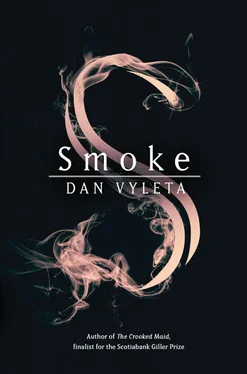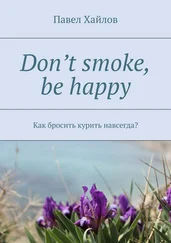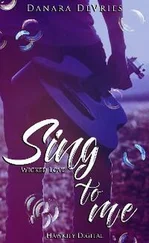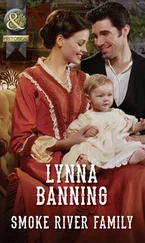And threaded into their Smokes, unpredictable, at turns more controlled and more volatile than either’s, is Livia’s, in violet and green. Her mother, crying, in front of the cell she had built to make prisoners of little boys and girls. Her father strapped to his attic bed, staring up at her with fearful eyes. Francis the miner walks in, tugging a pony on bandy legs. Grendel, her killer angel, brandishing a snub-nosed gun; Mowgli hiccupping his first billow of Smoke. Thomas, half naked, holding out to her the black of the mask. Charlie, in darkness, tongue to her tongue.
“Yes?” she asks into the Smoke, her eyes closed, a hand on each of the boys.
“Yes,” says Charlie.
“Yes,” says Thomas. He removes the stopper, tilts the beaker, and washes Julius’s head in blood. The next moment Charlie pushes Julius’s body to the centre of the pool; the Soot shifting with him, his bridal train, his burial shroud.
Then they step back, Livia, Thomas, and Charlie.
And run like hell.
If thou art displeas’d with Lawes Divine, and Civil,
I know not what will fit thee, but the Devil.
“THE ANABAPTISTS”
Then wonder not at them so black in skin
But at your selves so foul, so black by sin.
“THE BLACKAMORES”
The liver doth contain unwholesome blood,
And Melancholick, which is never good.
Of this disease if you the Symptomes heed,
The fundamental veins break forth and bleed.
“THE HEMERRHOIDES”
ROWLAND WATKYNS, FLAMMA SINE FUMO (SMOKE WITHOUT FLAME, 1662)
H ow do you start a revolution?
You baptise a corpse.
That’s what we will say when they ask us, years down the road. Oh, they will tell us that we did it for the wrong reasons. Charlie because he is ashamed of his privilege, and Livia because she wants to impress her mother. And I because I love them more than I fear myself. And because I could not stomach the thought of returning to school.
Does anyone ever do anything for reasons better than these?
We wait for the Smoke by the banks of the Thames. We are not alone. Crowds have gathered, are staring downriver at the storm front moving in. Others are fleeing the city. They are walking so fast they will be deep in the home counties before nightfall. A steady stream of vagrants, trampling on good folks’ lawns. Harbingers of change.
We did not see very much before we left the sewers. No explosions; no fireworks. Something moved in the pools behind us, a shadow spreading in the water. That’s all. Out on the street all was quiet; a prisoner singing in the gaol adjoining the tobacco factory, a forlorn tenor, straining against the limits of his range. Charlie asked Livia whether she wanted to go to Grendel’s and find out how her mother was, but she only shook her head. Livia wants her mother’s love; is worried sick about her leg. But she is angry with her, too. So we kept to the streets.
Dawn came slowly, us walking around, trying to stay warm. Without meaning to, we drew to our church just as the sun came up. The gates remained barred, the windows broken, but the cross on top caught the weak light. Brass. It is a miracle nobody has bothered to steal it.
As dawn turned into morning, we started to get restless.
“Maybe,” Charlie said, “maybe it did not work.” An odd note to his voice as though he did not know how to feel.
“Maybe.”
By ten o’clock we could see the river start to boil.
It happened very quickly, deep under the surface, a darkness spreading, like a school of black herring hurtling upriver, forswearing the salt of the sea. The speed of a dark thought. On the surface, hovering an inch or two above the water, Smoke formed, shaping a second river, following its bend.
The real change, though, happened far from us. Somewhere there, in the east of London, where the river widens and begins its journey into the sea, something blew up. I have no better way of saying it. A column of Smoke reaching up into the sky, its borders clean, defined near the ground then fraying into a thousand threads and dispersing into the clouds. God only knows what caused it. Perhaps that’s where Sebastian engineered the sewers to release the flood. Perhaps Julius drifted there, borne along by strange currents, and only there released the full brunt of his pyre. Or else the Quickening found a repository of Soot so rich as to make Sebastian’s pools look like puddles. Spit in the ocean. Out of the cloud, rain is forming. We are too far away to know whether it’s black.
Charlie turns to me. At some point during the night he managed to smear Soot over his lip in precisely such a way that it looks like a moustache. It suits him. Soots him. I almost smile. His hands too remain stained from where he pushed Julius under the waterline. The devil, washed of his sins in infected blood.
Charlie was his baptist.
“We should run for the hills,” he says now. “Get above the cloud level. Wait the worst of it out.”
I know he wants to protect me, that he is worried what might happen to me and my volatile blood. But I shake my head.
“Above the cloud level? In England? No, Charlie, we made a choice. Pandora’s box. We opened it. Now we have to brave it out.”
I take his hand again into my aching right one, take Livia’s into my left. We have been walking like this most of the morning. A storm is gathering. I may be headed for madness, the world for the abyss.
I have never been happier in my whole life.
Charlie, too, looks happy.
“Do you know what theatre is?” he whispers, not really asking, musing aloud. “A boy at school told me about it. Grown people acting out a story. Love, revenge, the fall of kings. For more than two hundred years now, it has been banned.” He smiles, almost shyly. “Do you think there’ll be theatre again, after the Smoke?”
And then he goes on, still smiling, but sadder now, thoughtful: “It won’t work, you know. It cannot work. Us three.”
“Why?”
I see him struggle to put it in words.
“We are more than friends. We love one another. And when people love one another, there is Smoke involved. Here,” he raises the hand that joins him to Livia, “but also here,” he raises the hand that joins him to me. “Livia can’t marry both of us,” he adds shyly then is surprised when she stops him and tells him off.
“Why not, Charlie Cooper? It’s a new world. Who can tell us now what we can or cannot do?”
And she kisses him and she kisses me, and a chimney sweep standing next to us in his dirty suit cheers and offers us dusty applause.
The last word goes to me.
“Shall we?” I ask.
Together, hand in hand, we walk into the shadow of the cloud.
We thank the Smoke.
Like most texts purporting to be about the past, this is a book about the present. The past is to it both canvas and foil: a shadow thing that makes thinking about ourselves more interesting, less fettered to good sense. The novel may be political but it has no thesis: novel writing is interesting to me in so far as it is an open-ended process — a search, a jazz solo — rather than the skilful realisation of a pre-existing blueprint or the rehearsal of a subtly constructed argument. The best relationship of an author to his or her novel, I believe, is that of a reader; for to the reader belongs that greatest act of creation where stories are concerned, the transformation of words and sentences into tentative meaning, forever on the move.
This particular novel found me more than I searched for it. It grew out of a chance encounter with the Dickens quote that opens the book and reconnected me to a childhood feeling of being ambushed by narrative, a feeling both luxurious and urgent. For this I am deeply grateful; and grateful too to those people who encouraged me to surrender to this feeling wholesale (for it takes courage, sometimes, to indulge oneself). These are Simon Lipskar, my agent, who threatened me with violence and perdition were I not to pursue this project; my editors, Bill Thomas, Kirsty Dunseath, and Jennifer Lambert, whose insight and kindness enabled me to give the book its final shape; and James Boyd White and Andrew Herbert Merrills, who read early drafts and offered sage advice. My greatest thanks goes to my wife, Chantal, who read each chapter with me hovering in the background pacing to and fro asking, Are you finished yet? For your patience as much as your encouragement, my love, I thank you from the bottom of my heart.
Читать дальше












